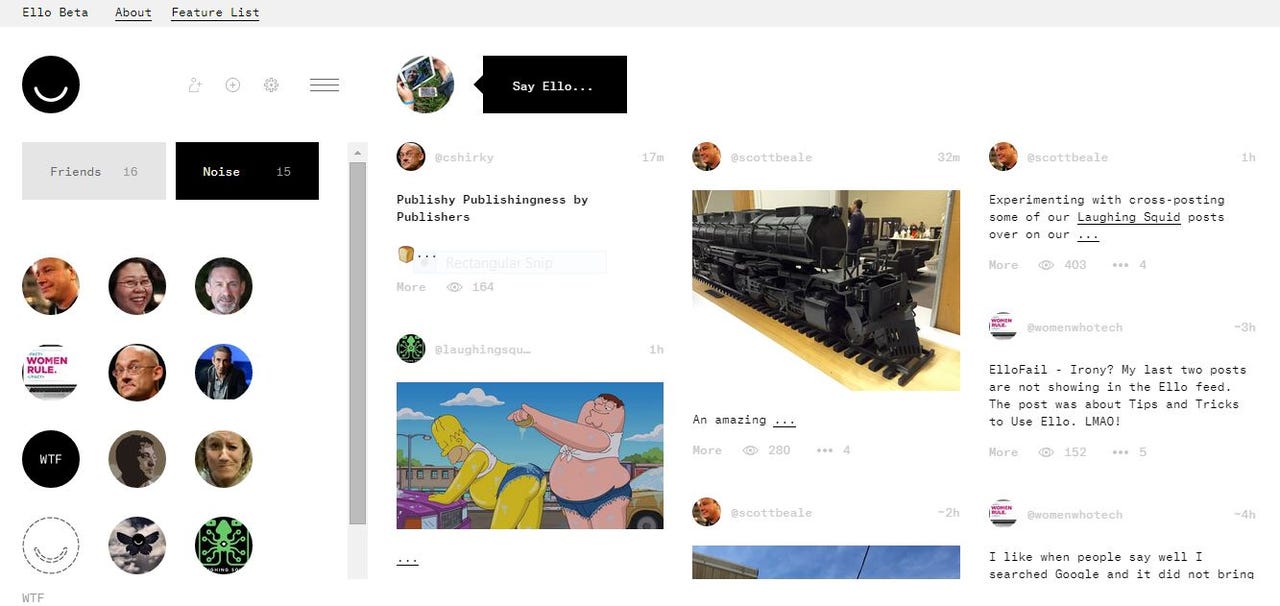Will new social network Ello finally topple Facebook's dominance?

You are not a product.

These are powerful words coming from the newest social network to reach its tipping point in September. Burlington, Vermont business Ello launched in March 2014 and has been steadily gaining in popularity.
Towards the end of September up to 31,000 people per hour were joining the site. Ello claims to be different to Facebook in as much as it does not sell ads or data to third parties.
The site states that "collecting and selling your personal data, reading your posts to your friends, and mapping your social connections for profit is both creepy and unethical. Under the guise of offering a "free" service, users pay a high price in intrusive advertising and lack of privacy".
For those tired of Facebook’s sponsored stories, posts and sidebar advertisements, Ello seems to be the nirvana that everyone has been waiting for. Ello invites have been offered for sale on Ebay as desperate people clamour to secure a place on the invite only site.
Everything users post on Ello is visible to everyone else on and off the network. To see what the fuss is all about, just visit the home page and click one of the public profiles to see what people are posting.
Ello states it is completely free to use. It also says that if you do not like the direction that Ello is heading you can always delete your account though data might remain on its servers even after deletion.
One feature that the service offers is the ability to opt out of Google analytics so that neither Ello or Google can easily trace saved information back to the individual -- unless you use the Chrome browser, an Android device or have used Google search or YouTube recently. Ello then can not control what data is going back to Google.
What does Ello intend to do as it grows?
A lot of business is conducted over social networks nowadays. Brands regularly reach out to their customers with offers, incentives and events. There is nothing I can see in Ello to stop a brand joining Ello and connecting with its customers to offer similar incentives.
Ello certainly does not mention brand accounts in its initial Privacy policy or Information use page. All the company says is that you do not have to follow anyone you do not want to follow.
So how will Ello monetise its services and buy the massive infrastructure, incorporate enterprise scale and network resilience that it will need if it keeps on growing at its current speed?
One way is by offering parts of the service at a price. It asks for users’ support by buying "special features" such as the ability to customise your interface. It will ask for a "very small" amount of money to add features to your Ello account "forever".
But this "very small" amount of money might not give the company enough revenue to grow at the phenomenal rate that it is currently growing.
Affiliate partners might bring in some extra revenue (Ello has said that it may share information with its affiliates if it decides to go down this route).
So will Ello succeed in its efforts or will it become just another forgotten Facebook rival? Its motives are appealing to users who hate ads — but how will it appeal to investors, brands and advertisers that could potentially generate huge amounts of revenue — and profit for the company?
Ello acknowledges that other social networks “like Twitter, Facebook, Tumblr, Google+, Instagram, etc.” started out ad-free, then suddenly "switched gears". But the founders say that they are not interested in ruling the world and becoming billionaires.
Social networks realised that VC and investor funding would dry up if the network did not show a good return for investors. Some networks are free, others operate behind a paywall.
Others, such as Pheed offer channels which users have to pay a premium for (such as $1.99 for 30 days access) to the feed. Facebook has always said that it is "free and always will be".
Will Ello move to an ad-based network like Facebook? Probably not. The site’s primary theme is "audacity, beauty, simplicity and transparency", not revenue, reach, uptime and profit.
Facebook at 10
Whilst in stealth mode it attracted initial funding from investors. In January it filed notice of $435,000 in Equity funding expecting a further $315,000 funding in future from Fresh Tracks Capital.
Investors will want something for their cash, especially if the network is successful and at the rate that Ello is growing at the moment it seems like it will be.
Its growth might be unsustainable as the company scrambles to employ more developers to keep pace with its explosive growth.
Ello will need to add hardware — and bandwidth to help it keep up with demand.
It needs data centres, resilience, data security, 5x9’s or more uptime guarantees to stop its users turning away (remember Twitter’s fail whale?).
The company might bring in search capability and invite investment as Facebook did. In October 2007 Microsoft bought a 1.6 percent stake in Facebook for about $240 million. It then brought Bing in as the search engine used when you search for things within Facebook.
It could sell its accumulated data to analytics firms who want to mine the social web. Twitter gives access to its firehose to a select few companies who pay to access its data.
But as Ello does not enforce a real names policy, you might be buying data from fantasy characters living in a porn friendly ad-free world, empowered that they can "connect, create and celebrate life".
I hope it works out like its creators originally planned it to be and it remains on its idealistic ad-free path.